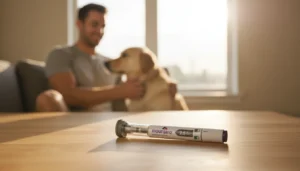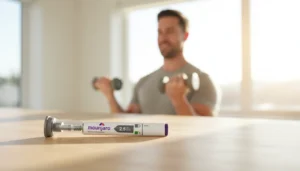What Helps with Sulfur Burps from Mounjaro? Tips for Relief and Management

Introduction
Have you ever found yourself in a social setting, only to be embarrassed by a sudden, unwanted belch that smells distinctly like rotten eggs? If you have recently started taking Mounjaro, you may be familiar with the unsettling experience of sulfur burps. While perhaps not the most glamorous aspect of your weight loss journey, understanding why these burps occur and how to manage them can make a significant difference in your overall comfort and confidence.
Mounjaro (tirzepatide) is an FDA-approved medication primarily used to help adults with type 2 diabetes manage their blood sugar levels. However, it is also often prescribed off-label for weight loss. As effective as it is for these purposes, Mounjaro can lead to several digestive side effects, including sulfur burps. These burps result from the production of hydrogen sulfide gas in your digestive system, which can be exacerbated by the medication’s mechanism of action, slowing down gastric emptying.
In this blog post, we’ll delve into the causes of sulfur burps associated with Mounjaro, explore dietary and lifestyle adjustments that can help alleviate this issue, and discuss when it may be necessary to consult a healthcare provider. Our aim is to provide you with practical strategies to manage these burps effectively, allowing you to focus on your health journey without the distraction of uncomfortable side effects.
Understanding Sulfur Burps
What Are Sulfur Burps?
Sulfur burps are characterized by a foul odor reminiscent of rotten eggs, caused by the presence of hydrogen sulfide gas. This gas is naturally produced during the digestion process, particularly when certain sulfur-containing foods are broken down by bacteria in the gastrointestinal tract. While occasional sulfur burps can be considered normal, frequent occurrences can be bothersome and may indicate underlying digestive issues.
How Do Sulfur Burps Relate to Mounjaro?
Mounjaro works by mimicking the action of a natural hormone called glucagon-like peptide-1 (GLP-1), which plays a crucial role in regulating appetite and food intake. One of the side effects of this medication is delayed gastric emptying, which can lead to food remaining in the stomach longer than usual. This extended duration allows for increased fermentation by gut bacteria, resulting in the production of hydrogen sulfide gas and, subsequently, sulfur burps.
The Prevalence of Sulfur Burps with Mounjaro
Studies have shown that around 2% to 3% of patients taking Mounjaro report experiencing burping as a side effect, with sulfur burps being a subset of this issue. It’s essential to note that these side effects may become more pronounced with higher doses of the medication or during the initial adjustment period.
Tips for Managing Sulfur Burps from Mounjaro
While sulfur burps can be an annoying side effect of Mounjaro, there are several strategies you can implement to minimize their occurrence and discomfort. Here’s what we can do together to tackle this issue head-on.
1. Dietary Adjustments
One of the most effective ways to manage sulfur burps is by modifying your diet. Certain foods are known to produce hydrogen sulfide gas during digestion, and limiting these can help reduce the frequency of burping.
Foods to Avoid:
- High-Sulfur Foods: Foods such as eggs, meat, fish, dairy products, onions, garlic, and cruciferous vegetables (like broccoli and Brussels sprouts) are high in sulfur and may contribute to sulfur burps.
- Processed Foods: Fried foods and those high in fats can slow digestion further, exacerbating the problem.
- Carbonated Beverages: These can increase gas buildup in the digestive tract.
Foods to Embrace:
- Low-Sulfur Alternatives: Incorporate more leafy greens, lean proteins (like chicken and fish), and whole grains into your diet. These options are less likely to produce hydrogen sulfide gas.
- Fiber-Rich Foods: Include high-fiber foods like beans, lentils, and whole grains to support healthy digestion and minimize gas production.
2. Hydration
Staying well-hydrated is crucial for maintaining a healthy digestive system. Drinking plenty of water helps food move through your gastrointestinal tract more efficiently, reducing the likelihood of gas buildup and sulfur burps. Aim for at least eight glasses of water per day, and consider drinking a glass before and after meals to aid digestion.
3. Eating Smaller, More Frequent Meals
Rather than consuming three large meals each day, consider switching to smaller, more frequent meals. This approach can help prevent excessive food buildup in your stomach, minimizing fermentation and gas production. Additionally, eating slowly and chewing thoroughly can also reduce the amount of air swallowed, which contributes to burping.
4. Physical Activity
Regular physical activity can significantly enhance your digestive health. Engaging in light exercise, such as walking after meals, can help stimulate digestion and reduce the likelihood of gas accumulation in the digestive tract. Aim for at least 150 minutes of moderate exercise each week, incorporating both aerobic and strength training activities.
5. Over-the-Counter Remedies
If dietary changes and lifestyle modifications aren’t providing sufficient relief, consider incorporating over-the-counter remedies into your routine. Some options include:
- Simethicone: This anti-gas medication helps reduce bloating and discomfort by breaking up gas bubbles in the digestive tract.
- Bismuth Subsalicylate (Pepto-Bismol): This medication can help alleviate gas and reduce the unpleasant odor associated with sulfur burps.
- Digestive Enzymes: Supplements that contain enzymes can assist in breaking down food and reducing gas production.
- Herbal Teas: Consider drinking ginger, peppermint, or chamomile tea, which can soothe digestion and reduce gas.
6. Monitor Food Intolerances
Be mindful of any food intolerances or sensitivities you may have, as these can exacerbate digestive issues. Keeping a food diary may help you identify specific triggers that lead to increased gas or discomfort. If you suspect you have food intolerances, consult with a healthcare provider to explore further testing or dietary recommendations.
7. Consult with a Healthcare Provider
If sulfur burps persist despite trying the above strategies, or if they are accompanied by other troubling symptoms such as severe abdominal pain, nausea, or diarrhea, it’s essential to consult with a healthcare provider. They can help assess your condition, adjust your dosage, or recommend alternative treatment options.
When to Seek Medical Attention
While sulfur burps are often harmless, there are instances where they may indicate a more serious underlying condition. If you experience any of the following symptoms, it’s crucial to seek medical advice:
- Persistent or worsening abdominal pain
- Severe bloating or discomfort
- Nausea or vomiting that doesn’t improve
- Diarrhea or constipation lasting more than a few days
- Unexplained weight loss
- Symptoms of gastroesophageal reflux disease (GERD), such as heartburn or regurgitation
Your healthcare provider can evaluate your symptoms and determine the best course of action to ensure your health and well-being.
Conclusion
Managing sulfur burps while taking Mounjaro can be challenging, but with the right strategies, you can significantly reduce their impact on your daily life. By making dietary adjustments, staying hydrated, eating smaller meals, and incorporating regular physical activity, we can work together to alleviate this common side effect. Remember, you are not alone in this journey, and seeking support from healthcare professionals is always a wise choice when navigating the complexities of weight loss medications.
As we continue to focus on our health goals, let’s prioritize our comfort and well-being by implementing these practical tips. If you are considering personalized weight loss solutions or need further assistance, we invite you to take our free assessment quiz to explore the options available through TrimRx. Together, we can embark on a journey toward a healthier, happier you.
FAQ
What causes sulfur burps when taking Mounjaro?
Sulfur burps are primarily caused by the production of hydrogen sulfide gas during the digestion of sulfur-containing foods. Mounjaro slows gastric emptying, allowing food to ferment longer and leading to increased gas production.
How can I reduce sulfur burps while on Mounjaro?
To reduce sulfur burps, consider avoiding high-sulfur foods, staying hydrated, eating smaller and more frequent meals, and incorporating regular physical activity into your routine. Over-the-counter remedies may also help.
Are sulfur burps a sign that Mounjaro isn’t working?
No, sulfur burps are a common side effect and do not indicate that Mounjaro is ineffective. Many individuals experience varying side effects, and the presence or absence of sulfur burps does not correlate with the medication’s effectiveness.
When should I consult a doctor about sulfur burps?
Consult a healthcare provider if you experience persistent or worsening symptoms, such as severe abdominal pain, nausea, diarrhea, or unexplained weight loss. They can help evaluate your condition and recommend adjustments to your treatment plan.
Can other medications cause similar side effects?
Yes, other medications in the GLP-1 receptor agonist class, such as Ozempic and Wegovy, can also cause sulfur burps due to their similar mechanisms of action. If you are experiencing severe side effects, consult your provider to explore alternatives.

Transforming Lives, One Step at a Time
Keep reading
Mounjaro First Month Results: What to Expect
During your first month on Mounjaro (tirzepatide), expect modest but meaningful weight loss. Clinical trial data from the SURMOUNT-1 study shows that participants lost…
Mounjaro 3 Month Results: What to Expect
After three months on Mounjaro (tirzepatide), most people lose between 4% and 7% of their starting body weight. Clinical trial data from the SURMOUNT-1…
Mounjaro Weight Loss Results: Clinical Data and Real Outcomes
Mounjaro has become the most talked-about weight loss medication for a reason: the results are unprecedented. Clinical trials show average weight loss of 22.5%…



